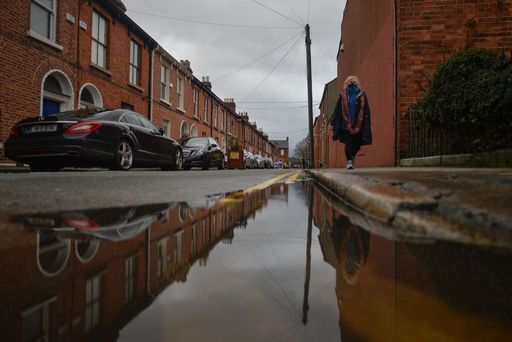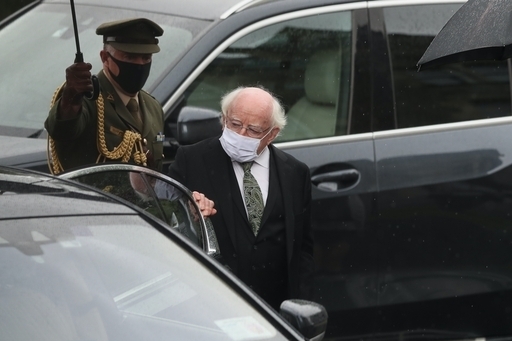President Michael D Higgins joined bishops and academics in tributes to the theologian Fr Enda McDonagh who died this week aged 90.
In his tribute, Archbishop Michael Neary of Tuam described the former professor of moral theology at Maynooth as “a colossus on the Irish theological landscape for more than six decades”.
Though a priest of the archdiocese of Tuam, Archbishop Neary said Professor McDonagh was at home in every diocese in the country because he had taught generations of Irish priests. “Many will point to Enda as the person who opened their minds in the quest for ‘faith seeking understanding’,” he said.
Fr McDonagh was known and respected by people of all theological hues and none “because of the way he wore his learning so lightly, and because of his genuine humility and personal warmth, people felt comfortable in his presence, and enriched by the encounter”, the Archbishop said.
The theologian had a Doctorate in Divinity and a Doctorate in Canon Law. Appointed Professor of Moral Theology and Canon Law at the Pontifical University at Maynooth in 1958, when he was twenty-eight, he held the post until his retirement from full-time teaching in 1995.
“While he had well thought-out opinions of his own, he was always utterly respectful of those who had different and sincerely held opinions, and his good-humoured and personable manner always saw to it that nobody felt belittled in a discussion or debate,” Archbishop Neary said.
Fr McDonagh served as official chaplain to Mary Robinson while she was President of Ireland (1990-97). He actively supported the ecumenical movement and was involved with giving ecumenical retreats with the Church of Ireland and other Anglican clergy. In 2007, he was appointed as an honorary canon at St Patrick's Cathedral, Dublin.
He was critical of the Church’s stance on contraception and the ban on condoms to prevent the spread of HIV/AIDS. He also believed women should play a greater role within the Church.
In his tribute, President Higgins said the Co Mayo-born priest’s approach to philosophy, combined with a great personal capacity to communicate, meant that he was always in demand where conflicts had sown divisions, “as someone who could transcend reductive binaries”.
“Being a most prominent and quoted defender of the right to personal conscience meant that he had to have courage, and he had it, delivering it again and again, often in circumstances where his defence of the integrity of conscience would result in exclusions, or distancing, from those for whom he had the warmest and respectful feelings, but who were adamant in their differences,” the President said in a statement.
He also paid tribute to Fr McDonagh’s “sensitivity to the poor at home and abroad” which he said meant that he could see “the significance of the work of the Liberation Theology Movement as not only emancipatory, but also as a walking in the spirit of Christ with the excluded, the oppressed, and the unjustly treated”.
President Higgins said he brought the same perspective to the role he supported for women as equals in participation in Church and society.
“His, I recall so well, was the generous spirit that so many turned to, again and again, on public campaigns, when denunciations were so often more forthcoming than support, be it in relation to the ending of Apartheid, women’s rights, Travellers’ rights. He was always there to listen and support.”
“There are many who will recall, and I hope write of, his commitment to ecumenism, and the work that might bring an enabling peace on our island and in our relationship with others.”
Archbishop Michael Jackson said members of the Church of Ireland would be saddened by the death of Professor McDonagh, “a household name in Irish religious life”.
“Throughout that long life, Professor McDonagh carried his learning and erudition gracefully and at the same time fearlessly.
“Those of us who now take for granted a whole range of human rights and shared ecumenical opportunities are indebted to this soft spoken and fiercely argued man of God and man of ideas – but also man of justice – for the lifting up into the public consciousness of so much that is good and needful.”
Born on 27 June 1930 in Bekan, Co Mayo, Fr Enda McDonagh attended the local primary school where his parents were teachers.
He received his secondary education at St Jarlath’s College, Tuam, and from there he went to Maynooth in 1948 where he spent the rest of his life.
He was ordained to the priesthood in Maynooth on 19 June 1955. He took undergraduate degrees in science and theology before embarking on postgraduate work in theology culminating in a Doctorate in Divinity (DD) in 1957.
He continued his studies in Rome and Munich and was conferred with the Doctorate in Canon Law (DCL) in 1960.
In 1958, he was appointed Professor of Moral Theology in Maynooth, a position he was to hold until his retirement in 1995.



 Loading ...
Loading ...